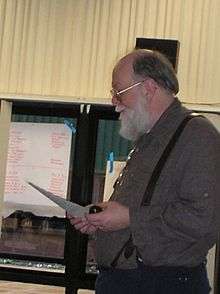John O'Brien (advocate)

John O'Brien is a leading thinker who has written widely[2][3] in the field of disability. He is a pioneer and lifelong advocate of Person Centred Planning.[4] To this end, he was co-developer of two models for person centred planning, namely the McGill Action Planning System (MAPS)[5] and Planning Alternative Tomorrows with Hope (PATH).[6] His values based approach emphasises learning with each person about the direction their lives could take, challenging and overcoming practices, structures and values that lead to segregation and underestimation rather than inclusion, and an approach to change in people's lives based on 'imagining better'.[7] His thinking is based on Social Role Valorisation[8][9] and the Social model of disability. He is an Associate Editor of Mental Retardation, and on the Advisory Boards of the Georgia Advocacy Office and Georgia PASS.[10]
Bibliography
- O'Brien, J. and Lyle O'Brien, C. 1988. A Little Book About Person Centred Planning. Inclusion Press, Toronto.
- O'Brien, J. and Lyle O'Brien, C. Make a difference: A Guidebook for Person Centred Direct Support. Inclusion Press, Toronto
- O'Brien, J. and Lyle O'Brien, C. 2006. Implementing Person Centred Planning: Voices of Experience. Inclusion Press, Toronto.
- O'Brien, J. (2006) Reflecting on Social Roles: Identifying Opportunities to Support Personal Freedom & Social Integration
- O'Brien, J., & Lyle O'Brien, C. (1998). The politics of person centered planning Part II. The Council, 15(2), 3. Towson, MD: The Council on Quality and Leadership in Supports for People with Disabilities.
- O'Brien, J., & Lyle O'Brien, C. (1998). The politics of person centered planning Part I. The Council, 15(1), 3. Towson, MD: The Council on Quality and Leadership in Supports for People with Disabilities.
- Lyle O'Brien, C., & O'Brien, J. (2002). The origins of person-centered planning: A community of practice perspective. In S. Holburn & P Vietze (Eds.), Research and practice in person-centered planning. Baltimore: Paul H. Brookes Publishing Co..
- O'Brien, J. (in press). The genius of the principle of normalization. In R. Flynn & R. LeMay (Eds.), A quarter-century of normalization and social role valorization: Evolution and impact. Ottawa: University of Ottawa Press.
- O'Brien, J., & Lyle O'Brien, C. (1998). The politics of person centered planning. In C. Griffin, M. Flaherty, D. Hammis, R. Shelley, N. Maxson, & D. Spas (Eds.), Knowing the ropes: Reaching new heights in rural community employment (pp. 26–30). Missoula, MT: The Rural Institute, University of Montana.
- O'Brien, J. (2002). Numbers and faces: The ethics of person-centered planning. In S. Holburn & P. M. Vietze (Eds.), Person-centered planning: Research, practice, and future directions (pp. 399–414). Baltimore: Paul H. Brookes Publishing Co.
References
- ↑ "Archived copy". Archived from the original on 2009-02-01. Retrieved 2009-03-08.
- ↑ http://www.inclusion.com/jobrien.html
- ↑ http://thechp.syr.edu//rsapub.htm
- ↑ http://www.nwtdt.com/Events/NWTDT%20Community%20Cont%20NEW.pdf
- ↑ Singh, N.N. (2016). Handbook of evidence-based practices in intellectual and developmental disabilities. Evidence-Based Practices in Behavioral Health. Springer International Publishing. p. 145. ISBN 978-3-319-26583-4. Retrieved 29 April 2017.
- ↑ "Person-Centered Planning (PCP)". Project 10: Transition Education Network. Retrieved 12 June 2017.
- ↑ "Archived copy" (PDF). Archived from the original (PDF) on 2007-11-18. Retrieved 2009-03-09.
- ↑ "Archived copy" (PDF). Archived from the original (PDF) on 2008-10-11. Retrieved 2009-03-09.
- ↑ "Archived copy" (PDF). Archived from the original (PDF) on 2008-05-16. Retrieved 2009-03-09.
- ↑ "Archived copy". Archived from the original on 2011-07-20. Retrieved 2009-03-09.